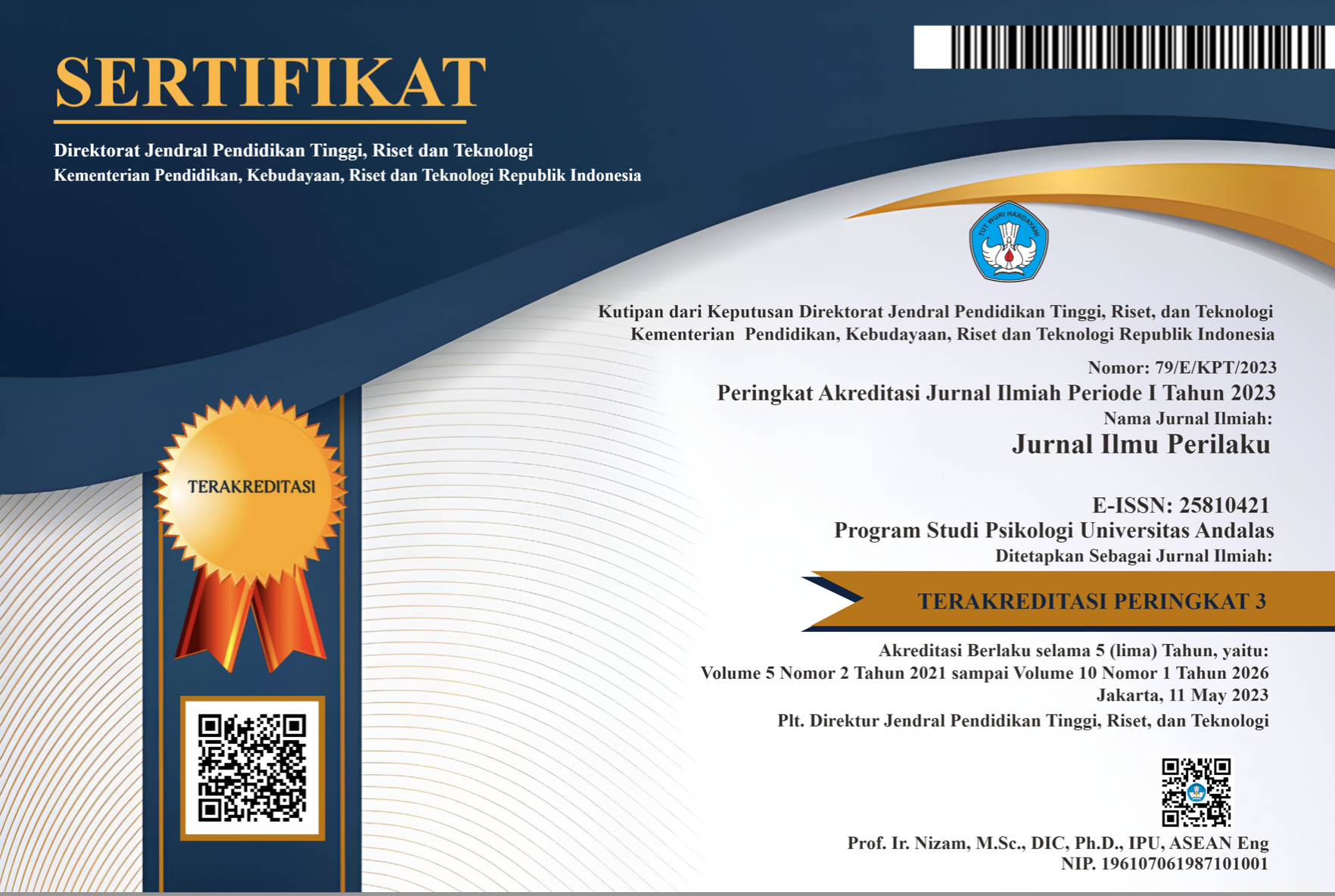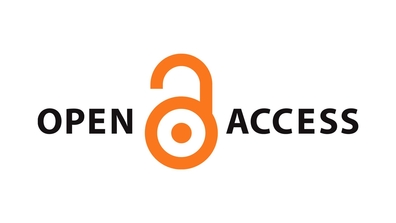Penanganan Cabin Fever melalui Terapi Kelompok Kognitif Perilaku pada Dewasa Muda selama Pandemi Covid-19
Abstract
The Covid-19 pandemic is perceived as an unpleasant experience for many people. The various consequences of the Covid-19 pandemic have attracted the attention of various parties, one of which is mental health issues. The restrictions on social activities over a long period of time invoked among others the phenomenon of cabin fever. Cabin fever is a popular term that describes a person’s psychological responses such as demotivation or uncomfortable feelings. This study aims to examine the effectiveness of cognitive behavioral group therapy as an intervention effort for cabin fever in experimental quantitative research. Quantitative data was collected using the cabin fever phenomenon scale. Group therapy participants were 6 young adults aged 20-22 years. Friedman ANOVA test showed a significant difference between pre-test, post-test, and follow up. This showed that group therapy with a cognitive behavioral approach is effective reducing cabin fever symptoms in young adults.
Downloads
References
Chen, R., Bao, Y., & Li, Z. (2021). From being trapped to breaking through: Manifestations of cabin fever in young people in response to COVID-19 and suggestions for adaptation. China Journal of Social Work, 14(2), 133-152. https://doi.org/10.1080/17525098.2021.1932542
Christo, M., Saraswati, L. D., Udiyono, A., & Sutiningsih, D. (2021). Mixed methods systematic review: Kejadian cabin fever selama pembatasan sosial saat penyebaran penyakit sars, mers dan covid-19. Jurnal Epidemiologi Kesehatan Komunitas, 6(2), 307-316.
Crawford. (2021). Editorial Perspective: Cabin fever the impact of lockdown on children and young people. Child and Adoloscent Mental Health, 26(2), 167-168.
Donald, I. N., & Carey, T. A. (2017). Improving knowledge about the effectiveness of psychotherapy. Psychoter Politics Int., e1424, 1-11. https://doi.org/10.1002/ppi.1424
Firmansyah, Y., Su, E., Buntara, I., Sutjipto, F. I., & Setiyati, P. N. (2020). Uji kesahihan interna dan kehandalan kuesioner cabin fever phenomenon (cfp) versi Indonesia. Jurnal Muara Sains, Teknologi, Kedokteran, dan Ilmu Kesehatan, 4(2), 443-452.
Gloria. (2020, July 1st). Isolasi Selama Pandemi Dapat Sebabkan Cabin Fever. Universitas Gadjah Mada. Retrieved from https://ugm.ac.id/id/berita/19639-isolasi-selama-pandemi-dapat-sebabkan-cabin-fever
Gravetter, F. J., & Forzano, L. B. (2011). Research methods for the behavioral sciences (4th ed). Cengage Learning.
Hadjistavropoulos, H. D., Chadwick, C., Beck, C. D., Edmonds, M., Sundstromb, C., Edwards, W., Ouellette, D., Waldrop, J., Adlam, K., Bourgeault, L., & Nugent, M. (2021). Improving internet-delivered cognitive behaviour therapy for alcohol misuse: Patient perspectives following program completion. Internet Intervention, 26, 1-12. https://doi.org/10.1016/j.invent.2021.100474
Hofmann, S. G., Asnaani, A., Vonk, I. J. J., Sawyer, A. T., & Fang, A. (2012). The efficacy of cognitive behavioral therapy: A review of meta-analyses. Cognitive Therapy and Research, 36(5), 427–440. https://doi.org/10.1007/s10608-012-9476-1
Hughes, J. L., & Asarnow, J. R. (2021). Implementing and adapting the SAFETY treatment for suicidal youth: The incubator model, telehealth, and the covid-19 pandemic. Cognitive and behavior practice (article in press). https://doi.org/10.1016/j.cbpra.2021.06.009
Ilpaj, S. M., & Nurwati, N. (2020). Analisis pengaruh tingkat kematian akibat covid-19 terhadap kesehatan mental masyarakat Indonesia. Jurnal Pekerjaan Sosial, 3(1), 16-28.
Kazdin, A. E. (2014). Evidence-based psychotherapies I: qualifiers and limitations in what we know. South African Journal of Psychology, 44(4), 381-403. https://doi.org/10.1177/0081246314533750
Kementerian Kesehatan Republik Indonesia. (2021). Situasi terkini perkembangan Coronavirus Disease (Covid-19) 30 Juli 2021. Ditemu kembali dari https://infeksiemerging.kemkes.go.id/document/situasi-terkini-perkembangan-coronavirus-disease-covid-19-30-juli-2021/view
Leszcz, M. (1992). The interpersonal approach to group psychotherapy. International Journal of Group Psychotherapy, 42(1), 37-62. https://doi.org/10.1080/00207284.1992.11732579
Mahoney, A., Li, I., Grierson, A., Millard, M., Haskelberg, H., & Mason, E. (2022). Internet-based cognitive behaviour therapy for insomnia before and during the COVID-19 pandemic. Australian Psychologist, 57(1), 65-76. https://doi.org/10.1080/00050067.2021.1979884
Mahoney, A., Li, I., Haskelberg, H., Millard, M., & Newby, J. M. (2021). The uptake and effectiveness of online cognitive behaviour therapy for symptoms of anxiety and depression during COVID-19. Journal of Affective Dissorder, 292, 197-203.
Nasrullah, & Sulaiman, L. (2021). Analisis pengaruh covid-19 terhadap kesehatan mental masyarakat di Indonesia. Media Kesehatan Masyarakat Indonesia, 20(3), 206-211.
Ost, L. G., Havnen, A., Hansen, B., & Kvale, G. (2015). Cognitive behavioral treatments of obsessive–compulsive disorder. A systematic review and meta-analysis of studies published 1993–2014. Clinical Psychology Review, 40, 156-169. https://doi.org/10.1016/j.cpr.2015.06.003
Pratiwi, P. C. (2017). Upaya peningkatan self-esteem pada dewasa muda penyitas kekerasan dalam pacaran dengan Cognitive Behavior Therapy. Jurnal Psikologi Ulayat, 4(2), 141-159. https://doi.org/10.24854/jpu60
Pratiwi, P. C., Mahanani, F. K., Budiningsih, T. E., & Halim, J. A. (2022). We are in the Same Boat: Group Therapy as a Treatment for Psychological Distress in Dating Violence Survivors. Journal of Educational, Health, and Community Psychology, 11(1), 33-55. http://dx.doi.org/10.12928/jehcp.v11i1.21955
Richards, K. C., Campenni, C. E., Muse-Burke, J. L. (2010). Self-care and well-being in mental health professionals: The mediating effects of self-awareness and mindfulness. Journal of Mental Health Counselling, 32(3), 247-264.
Rosenblatt, P. C., Anderson, R. M., & Johnson, P. A. (1984). The meaning of “cabin fever”. The Journal of Social Psychology, 123, 43-53.
Sagita, D. D., & Hermawan, D. (2020). Kesepian remaja pada masa pandemi Covid-19. Enlighten: Jurnal Bimbingan Konseling Islam, 3(2), 122-130.
Satuan Tugas Penanganan Covid-19. (2021). Peta sebaran. Ditemu kembali dari https://covid19.go.id/peta-sebaran
Seniati, L., Yulianto, A., & Setiadi, B. N. (2017). Psikologi eksperimen. Jakarta, PT INDEKS.
Shigemura, J., Ursano, R. J., Morganstein, J. C., Kurosawa, M., & Benedek, D. M. (2020). Public responses to the novel 2019 coronavirus (2019-nCoV) in Japan: Mental health consequences and target populations. Psychiatry and Clinical Neurosciences, 74(4), 281-282. https://doi.org/10.1111/pcn.12988
Syakurah, R. A., Linardi, V., & Bonita, I. (2021). Covid-19 infodemic and Indonesian emotional and mental health state. International Journal of Public Health Science, 10(4), 927-933.
Wang, C., Pan, R., Wan, X., Tan, Y., Xu, L., Ho, C. S., & Ho, R. C. (2020). Immediate psychological responses and associated factors during the initial stage of the 2019 coronavirus diseases (covid-19) epidemic among the general population in China. International Journal of Environmental Research and Public Health, 17, doi:10.3390/ijerph17051729
Wilkerson, A. K., Wardle-Pinkston, S., Dietch, J. R., Pruiksma, K. E., Simmons, R. O., Bunnell, B. E., & Taylor, D. J. (2022). Web-based provide training of cognitive behavioral therapy of insomnia: Engagement rates, knowledge acquisition, and provider acceptability. Cognitive Behaviour Therapy, 51(4), 343-352. https://doi.org/10.1080/16506073.2021.1996453
Yalom, I. D. (2015). New directions in group therapy. International Psychotherapy Institute.
Zandifar, A., & Badrfam, R. (2020). Iranian mental health during covid-19 epidemic. Asian Journal of Psychiatry, 51. https://doi.org/10.1016/j.ajp.2020.101990
The non-commercial use of the article is governed by the Creative Commons Attribution license as currently displayed on Creative Commons Attribution-NonCommercial-ShareAlike 4.0 International License.
JIP's spirit is to disseminate articles published are as free as possible. Under the Creative Commons license, JIP permits users to copy, distribute, display, and perform the work for non-commercial purposes only. Users will also need to attribute authors and JIP on distributing works in the journal.
Please find the rights and licenses in Jurnal Ilmu Perilaku (JIP).
- License
The non-commercial use of the article will be governed by the Creative Commons Attribution license as currently displayed on Creative Commons Attribution-NonCommercial-ShareAlike 4.0 International License.
- Author’s Warranties
The author warrants that the article is original, written by stated author(s), has not been published before, contains no unlawful statements, does not infringe the rights of others, is subject to copyright that is vested exclusively in the author and free of any third party rights, and that any necessary written permissions to quote from other sources have been obtained by the author(s).
- User Rights
JIP's spirit is to disseminate articles published are as free as possible. Under the Creative Commons license, JIP permits users to copy, distribute, display, and perform the work for non-commercial purposes only. Users will also need to attribute authors and JIP on distributing works in the journal.
- Rights of Authors
Authors retain the following rights:
- Copyright, and other proprietary rights relating to the article, such as patent rights,
- The right to use the substance of the article in future own works, including lectures and books,
- The right to reproduce the article for own purposes, provided the copies are not offered for sale,
- The right to self-archive the article.
- Co-Authorship
If the article was jointly prepared by other authors, the signatory of this form warrants that he/she has been authorized by all co-authors to sign this agreement on their behalf, and agrees to inform his/her co-authors of the terms of this agreement.
- Termination
This agreement can be terminated by the author or JIP upon two months’ notice where the other party has materially breached this agreement and failed to remedy such breach within a month of being given the terminating party’s notice requesting such breach to be remedied. No breach or violation of this agreement will cause this agreement or any license granted in it to terminate automatically or affect the definition of JIP.
- Royalties
This agreement entitles the author to no royalties or other fees. To such extent as legally permissible, the author waives his or her right to collect royalties relative to the article in respect of any use of the article by JIP or its sublicensee.
- Miscellaneous
JIP will publish the article (or have it published) in the journal if the article’s editorial process is successfully completed and JIP or its sublicensee has become obligated to have the article published. JIP may conform the article to a style of punctuation, spelling, capitalization, referencing and usage that it deems appropriate. The author acknowledges that the article may be published so that it will be publicly accessible and such access will be free of charge for the readers.










